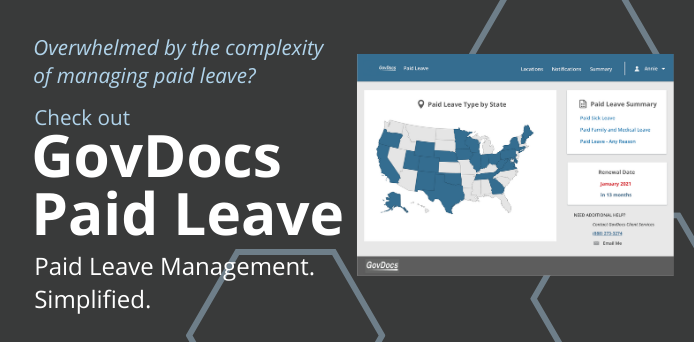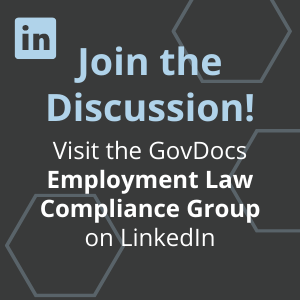EMPLOYMENT LAW NEWS
NYC Artificial Intelligence Hiring Law
By Kris Janisch
Published Jan. 19, 2022

The NYC artificial intelligence hiring law goes into effect Jan. 1, 2023.
New York City employers next year will have new requirements if they use artificial intelligence in hiring and promotion processes.
The New York City Council in December 2021 passed the law, which amended the city’s administrative code regarding how employers use “automated employment decision tools.” The measure was a response to how these artificial intelligence tools can create unconscious bias.
The law goes into effect Jan. 1, 2023.
New York City: AI in Hiring
Employers’ use of artificial intelligence in hiring practices has been growing for years. These types of tools help HR teams in several ways, including:
- Targeting potential applicants
- Expanding the search pool
- Screening candidates
However, the fairness of this technology has come under scrutiny. In October 2021, the Equal Employment Opportunity Commission (EEOC) announced it would launch an initiative to ensure that artificial intelligence and similar tools used in hiring and other employment decisions comply with federal civil rights laws.
“Artificial intelligence and algorithmic decision-making tools have great potential to improve our lives, including in the area of employment,” EEOC Chair Charlotte A. Burrows said in a statement. “At the same time, the EEOC is keenly aware that these tools may mask and perpetuate bias or create new discriminatory barriers to jobs. We must work to ensure that these new technologies do not become a high-tech pathway to discrimination.”
Illinois has a law on the books, and California and Washington, D.C., have seen proposals regarding the use of artificial intelligence in employment.
New York City: AI in Hiring
Starting next year, New York City employers that use these artificial intelligence tools have new requirements.
The most pressing of these is that employers must conduct a “bias audit.” Essentially, that means an independent auditor assesses the technology’s impact on an individual’s race, ethnicity, or sex.
According to the NYC artificial intelligence hiring law:
The testing of an automated employment decision tool to assess the tool’s disparate impact on persons of any component 1 category required to be reported by employers pursuant to subsection (c) of section 2000e-8 of title 42 of the United States code as specified in part 1602.7 of title 29 of the code of federal regulations.
Employers must also post the summary of the results of the most recent audit on their website.
Notice Requirement
Meanwhile, the NYC artificial intelligence hiring law also includes a notice requirement for employees or candidates who have applied for a job. The notice must include information that:
- An automated employment decision tool will be used in connection with the assessment or evaluation of such employee or candidate that resides in the city. The notice must be made no less than 10 business days before such use and allow a candidate to request an alternative selection process or accommodation
- The job qualifications and characteristics that an automated employment decision tool will be used in the assessment of such candidate or employee. Such notice shall be made no less than 10 business days before such use
- If not disclosed on the employer or employment agency’s website, information about the type of data collected for the automated employment decision tool, the source of such data and the employer or employment agency’s data retention policy shall be available upon written request by a candidate or employee. Such information shall be provided within 30 days of the written request
However, it would not be disclosed when that would violate local, state, or federal law, or interfere with a law enforcement investigation.
Definition of Auditing Tool
According to the text of the law, an “automated employment decision tool” means:
Any computational process, derived from machine learning, statistical modeling, data analytics, or artificial intelligence, that issues simplified output, including a score, classification, or recommendation, that is used to substantially assist or replace discretionary decision making for making employment decisions that impact natural persons.
That definition does not include tools such as junk email filters, antivirus software, etc.
Lastly, employers found in violation of the NYC artificial intelligence hiring law will be assessed a civil penalty of $500 for the first violation, and between $500 and $1,500 for each subsequent violation.
Conclusion
Most large employers use some form of artificial intelligence in hiring. But with equity, diversity and inclusion becoming more prominent in employment law, employers may want to keep an eye out for laws like New York City’s.
This Employment Law News blog is intended for market awareness only, it is not to be used for legal advice or counsel.
Keep Informed
with GovDocs Employment Law News
What is GovDocs?
GovDocs simplifies employment law compliance for large, multi-jurisdiction employers in the U.S. and Canada. The GovDocs software platform integrates three solutions in one convenient place to help you master the employment laws impacting your business. Whether you manage a postings, minimum wage or paid leave program, our products cut through research time, provide proactive insights into the everchanging landscape of employment laws and reduce the risk of noncompliance. The company is headquartered in St. Paul, Minn.
The GovDocs Poster Store simplifies posting compliance for employers with less than 30 locations across all industries, offering a variety of posting products to meet your labor law compliance needs.




